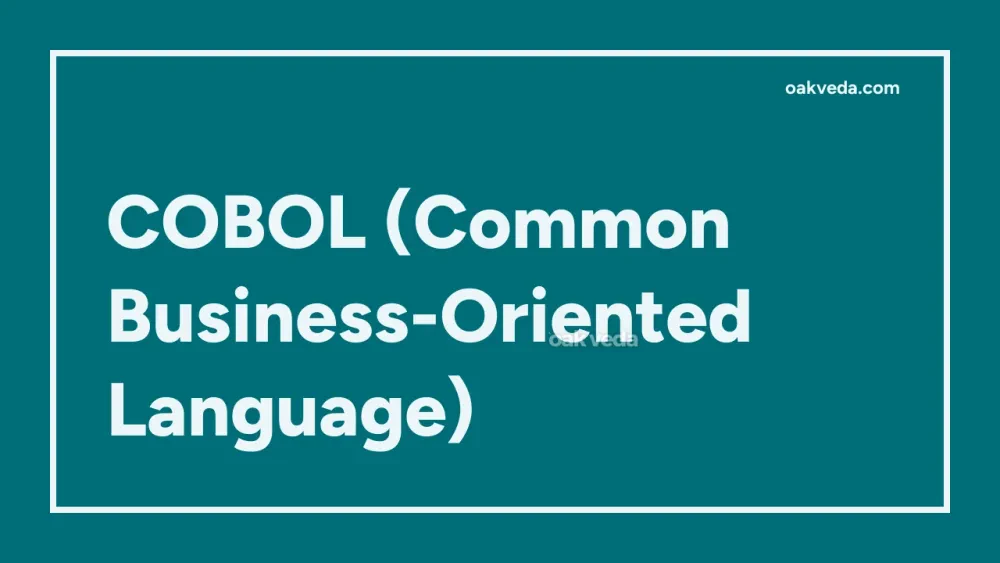
What is the Full Form of COBOL?
COBOL is an abbreviation for Common Business-Oriented Language. This full form accurately describes the primary purpose and focus of this programming language, which has been a cornerstone in business computing for decades.
What is Common Business-Oriented Language?
Common Business-Oriented Language, or COBOL, is a high-level programming language designed specifically for business applications. It was created with the goal of being readable and understandable by both programmers and non-technical users, making it easier for businesses to develop and maintain their software systems.
Origin and Development of COBOL
The history of COBOL dates back to the late 1950s:
- In 1959, a group of computer manufacturers, users, and government organizations formed the Conference on Data Systems Languages (CODASYL) to develop a common business language.
- Grace Hopper, often referred to as the "mother of COBOL," played a crucial role in its development.
- The first COBOL specification was published in 1960.
- Over the years, COBOL has undergone several revisions and updates:
- COBOL-68 (1968)
- COBOL-74 (1974)
- COBOL-85 (1985)
- COBOL 2002 (which introduced object-oriented features)
- COBOL 2014 (the latest major revision)
How does COBOL work?
COBOL is a compiled language, meaning that the source code written by programmers is translated into machine code before execution. Its syntax is designed to be similar to English, making it relatively easy to read and write. COBOL programs are structured into four main divisions:
- Identification Division
- Environment Division
- Data Division
- Procedure Division
This structure helps organize the code and separates different aspects of the program, such as file handling, data definitions, and actual processing logic.
Functions of COBOL
COBOL's primary functions include:
- Data processing: Handling large volumes of structured data efficiently.
- Report generation: Creating detailed business reports.
- File handling: Managing input and output operations for various file types.
- Mathematical computations: Performing complex calculations for business applications.
- Database management: Interacting with database systems for data storage and retrieval.
Applications of COBOL
Despite its age, COBOL continues to be used in various sectors:
- Financial services: Many banks and insurance companies still rely on COBOL for their core systems.
- Government agencies: COBOL is used in numerous government applications, particularly in administrative and record-keeping systems.
- Healthcare: Some healthcare providers use COBOL for patient record management and billing systems.
- Retail: Inventory management and point-of-sale systems often use COBOL.
- Transportation: Airlines and logistics companies use COBOL for reservation and tracking systems.
Features of COBOL
COBOL has several distinctive features that have contributed to its longevity:
- English-like syntax: Makes the code more readable and self-documenting.
- Robust data handling: Excellent for processing large volumes of structured data.
- Portability: COBOL programs can run on different hardware platforms with minimal modifications.
- Scalability: Capable of handling both small and large-scale applications.
- Integration capabilities: Can interface with other languages and modern technologies.
- Decimal arithmetic: Precise handling of financial calculations.
Benefits of COBOL
The continued use of COBOL in many organizations is due to several benefits:
- Reliability: COBOL systems have been tested and refined over decades, making them highly stable.
- Performance: For certain types of data processing tasks, COBOL can outperform modern languages.
- Maintainability: The readable syntax makes it easier for new programmers to understand and maintain existing code.
- Large codebase: Many organizations have millions of lines of COBOL code that would be costly and risky to replace.
- Specialized business logic: COBOL programs often contain complex business rules developed over many years.
Limitations or Challenges of COBOL
Despite its strengths, COBOL faces several challenges in the modern computing landscape:
- Aging workforce: Many experienced COBOL programmers are retiring, creating a skills gap.
- Limited modern features: While COBOL has been updated, it lacks some features of contemporary programming languages.
- Integration difficulties: Integrating COBOL systems with modern web and mobile technologies can be challenging.
- Perception issues: COBOL is often viewed as outdated, making it less attractive to new programmers.
- Limited development tools: Compared to modern languages, COBOL has fewer development tools and frameworks.
Future Developments in COBOL Technology
While COBOL's usage has declined, efforts are being made to modernize and extend its lifespan:
- Cloud integration: Tools are being developed to deploy COBOL applications in cloud environments.
- DevOps practices: Incorporating COBOL into modern development workflows and continuous integration pipelines.
- API development: Creating APIs to allow COBOL systems to interact with modern applications more easily.
- Training initiatives: Some organizations are investing in training new programmers in COBOL to address the skills gap.
- Open-source COBOL compilers: Projects like GnuCOBOL are making COBOL more accessible to a new generation of programmers.
FAQs on COBOL Full Form
-
Is COBOL still used today? Yes, COBOL is still used in many large organizations, particularly in finance, government, and healthcare sectors.
-
Why is COBOL called a business-oriented language? COBOL was designed specifically for business applications, focusing on data processing and report generation tasks common in business environments.
-
Can COBOL be used for web development? While not ideal for web development, there are tools and frameworks that allow COBOL programs to interact with web applications.
-
Is it worth learning COBOL in 2023? Learning COBOL can be valuable for those interested in maintaining legacy systems or working in industries that still rely heavily on COBOL applications.
-
How does COBOL compare to modern programming languages? COBOL excels in batch processing and handling large volumes of data but lacks some of the features and flexibility of modern object-oriented languages.
You may be interested in:

